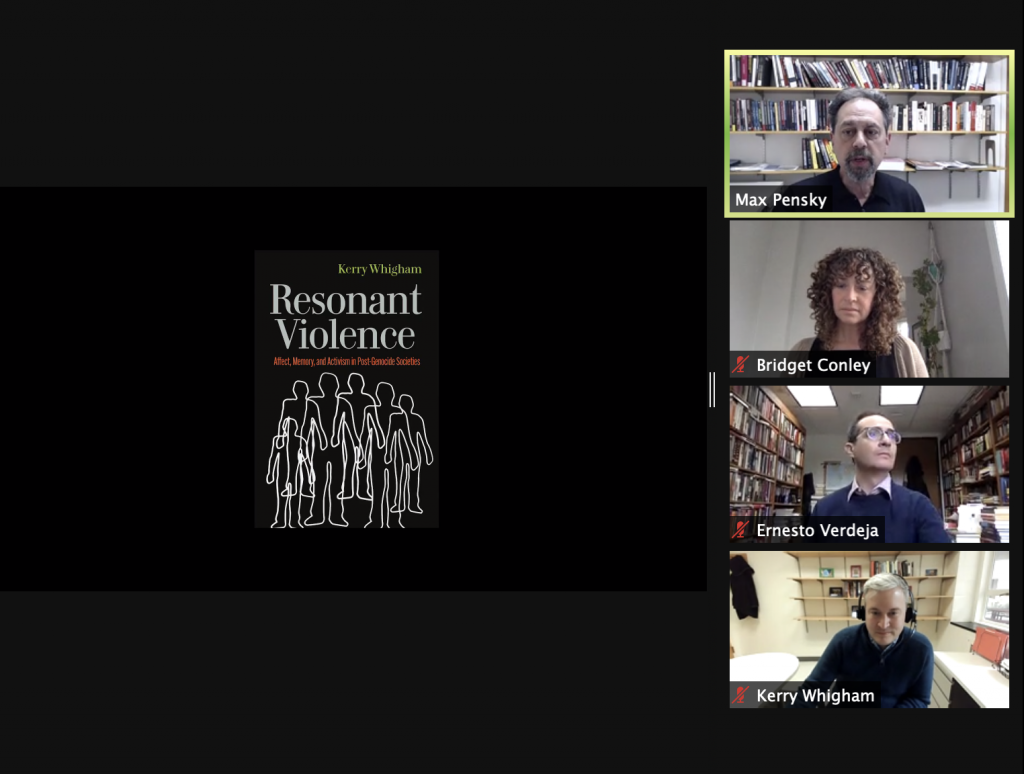Kerry Whigham, assistant professor at Binghamton University’s Institute for Genocide and Mass Atrocity Prevention (I-GMAP), launched his new book in a virtual presentation on Thursday.
Whigham’s “Resonant Violence: Affect, Memory and Activism in Post-Genocide Societies,” published on Feb. 11, centers around the concept of “resonant violence.” Whigham defined this phrase in his presentation.
“I developed this titular concept of resonant violence, which is the term I use to describe the affective energy of large-scale violence that both predicates the mass killing of groups and that continues to resonate within individuals and communities even after that killing stops,” Whigham said. “The murder of a group is only part of the violence of genocide. It also involves the construction of this emotional environment that allows for other forms of violence, like social inequality, institutional discrimination [and] economic disparity among social groups.”
In his book, Whigham uses resonant violence as a lens to examine specific instances of genocide, such as the post-Holocaust Berlin, post-military-dictatorship Argentina and the situation of Indigenous peoples in the United States. He also examines the ways societies resist and remember such violence.
“We often have a tendency to want to move forward [from past violence] without thinking about the ways that the abuses of the past remain present,” Whigham wrote in an email. “My goal is that this event and book show people how this past violence resonates, that is, how it continues to impact entire societies. But I hope they also see that there are ways to respond to the legacies of violence and build societies that are more vibrant because they can respect and celebrate the diversity of all those living within them.”
Two of Whigham’s colleagues in the field of genocide and mass atrocity prevention studies joined him in the presentation as panelists. Ernesto Verdeja, associate professor of political science and international peace studies at the University of Notre Dame, described the aspects of Whigham’s book that were notable to him, and asked Whigham questions to further the conversation. Verdeja praised Whigham’s incorporation of performance studies into his work and emphasized its importance.
“The use of performance studies really thinks about the role of embodiment here,” Verdeja said. “Not just the cognitive or abstractly moral dimensions to dealing with histories of violence, but thinking about how people embody spaces and how this helps us interpret history and our place in it. I’d be curious to hear about how you understand the relationship [between] embodiment and democracy.”
Bridget Conley, associate research professor at Tufts University and research director at the World Peace Foundation, brought her expertise and experience working in museums to the discussion. Conley also noted Whigham’s emphasis on performance studies.
“I would second [Verdeja’s] point that the performative nature of memory is enormously beneficial,” Conley said. “[I] spent 10 years at a museum and then went into the political science approaches to transitional justice where memorials and museums are categorized as symbolic reparations. But that [doesn’t reflect] the real lived experience of that continual activism, change, the embodied process and even the tour itself, where knowledge and understanding is generated through a performance. ”
One of Whigham’s former students, Jason Bond, a third-year Ph.D. student studying philosophy, attended the event because Whigham had referenced the book in class and was curious to learn more about the concept of resonant violence. Bond enjoyed the varying levels of discussion held at the event.
“I was impressed by the level of productive engagement within just an hour,” Bond said. “The guest panelists asked insightful, provocative questions that offered Kerry an opportunity to elaborate on key claims in his book. The entire event was a nice blend of higher-level academic engagement and more casual discussion of basic ideas.”
Jacob Sirof, a Master of Public Administration (MPA) student in his final semester, who is also pursuing a GMAP certificate, said he attended the event because he enjoyed Whigham’s class, “Comparative Genocides,” and wanted to celebrate the professor’s achievement.
“He is an excellent writer and teacher,” Sirof said. “I wanted to show my support for him. It was a great opportunity to connect further with my GMAP professors in a more casual and festive setting.”



